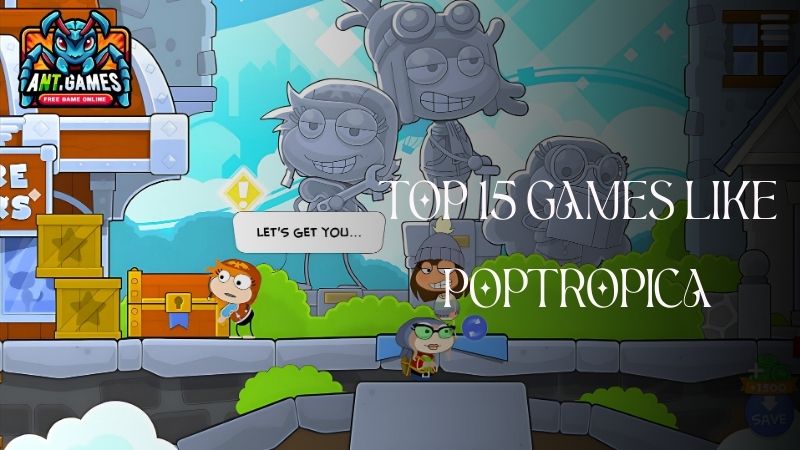cRPG stands for Computer Role-Playing Game. It is a video game genre where players control a character or a group, shaping their journey through decisions, combat, and exploration. These games focus on character progression, often tracked through stats, skills, and abilities. Most CRPGs take place in detailed, immersive worlds, drawing inspiration from tabletop RPGs like Dungeons & Dragons. They borrow elements such as turn-based combat, deep storytelling, and strategic decision-making. Players navigate expansive environments, interact with non-playable characters (NPCs), and influence the story through choices. The appeal of CRPGs lies in their freedom, complexity, and replayability, making them a favorite for those who enjoy rich narratives and strategic gameplay.
In this article, AntGames will dive into the fascinating world of cRPG and explore the differences between cRPGs and traditional RPGs. From gameplay mechanics to storytelling styles, discover how these genres offer unique experiences for every player.
What is a cRPG?
A CRPG (Computer Role-Playing Game) is a video game genre that focuses on character development, deep storytelling, and strategic gameplay. These games draw inspiration from tabletop RPGs like Dungeons & Dragons and often include:
- Character Customization – Players create and customize their characters, selecting attributes, skills, and sometimes moral alignments.
- Narrative Depth – Rich, branching storylines change based on player choices, leading to multiple outcomes.
- Turn-Based or Real-Time Combat – Battles require strategy, whether in turn-based or real-time formats.
- Exploration – Players navigate vast worlds, blending open-world freedom with structured progression.
- Party Mechanics – Many CRPGs let players control a team, each member with unique abilities and roles.
- Dialogue Trees – Conversations with NPCs shape the story and relationships through choice-driven dialogue.
The History of cRPGs
Computer Role-Playing Games (cRPGs) have a rich and captivating history that has significantly shaped the landscape of interactive digital storytelling and game design.
- The Birth of CRPGs (1970s to 1980s): CRPGs emerged in the late 1970s with Akalabeth, a pioneering title by Richard Garriott. This game set the stage for deeper, more complex adventures. The 1980s introduced iconic series like Ultima and Wizardry, which refined the genre with character creation, turn-based combat, and dungeon crawling—core mechanics still used today.
- The Golden Age of CRPGs (1990s): The 1990s became a golden era for CRPGs, delivering groundbreaking titles like Baldur’s Gate and Fallout. These games elevated the genre with rich storytelling, deep character progression, and moral choice systems. Player agency became a defining feature, allowing choices to shape the world and narrative in meaningful ways.
- The Modern Era (2000s and Beyond): Advancements in 3D graphics and gameplay mechanics pushed CRPGs into new territory. Games like The Elder Scrolls series blended classic RPG depth with cutting-edge technology. The genre expanded into subgenres like action RPGs, tactical RPGs, and and MMORPGs have further diversified the genre, offering unique and immersive gameplay experiences.
- Today: Today, CRPGs remain a vital part of the gaming landscape, seamlessly blending their storied past with modern innovations. From traditional dungeon crawlers to expansive open-world epics, the genre continues to captivate players worldwide with its immersive storytelling and complex gameplay mechanics.

How is a cRPG different from a standard RPG?
While both cRPGs and standard RPGs share core role-playing elements, they differ significantly in their platform, gameplay mechanics, and social dynamics. Here’s a breakdown of their key differences:
|
cRPG |
RPG |
|
| Platform | Computer/Console | Paper, Dice, Imagination |
| Gameplay | Digital, often turn-based or real-time combat | Collaborative storytelling, dice rolls for outcomes |
| Character Management | Digital interface, stats, abilities, inventory | Paper sheets, manual tracking, dice for skill checks |
| Combat | Automated, tactical (real-time or turn-based) | Manual, dice-based, resolved by GM or players |
| Storytelling | Branching narratives, interactive dialogue | GM-driven, dynamic based on player choices |
| Social Interaction | Online multiplayer or local co-op play | In-person or online with group interaction |

See more: Video game genre
Best cRPG games of all time
If you are wondering and looking for some popular best cRPGs, we will recommend the following titles:
- Baldur’s Gate: A classic, set in the Forgotten Realms of Dungeons & Dragons, this game offers deep storytelling, strategic combat, and meaningful player choices, setting the standard for modern cRPGs.
- Divinity: Original Sin 2: Renowned for its rich narrative, turn-based combat, and co-op multiplayer, this game offers immense freedom in gameplay, letting players shape their own paths and outcomes.
- Planescape: Torment: Known for its unique storytelling and character-driven narrative, this cRPG emphasizes dialogue and choices, offering an immersive experience in a surreal world.
- The Witcher 3: Wild Hunt: Combining open-world exploration with intricate storytelling and character development, The Witcher 3 offers a visually stunning experience with branching narratives and real-time combat.
- Pillars of Eternity: A spiritual successor to Baldur’s Gate, this title brings classic isometric, party-based cRPG gameplay with a focus on deep lore, world-building, and character progression.

See more: What Are FPS and TPS Games?
How do combat mechanics differ in Action RPGs compared to CRPGs?
Action RPGs (ARPGs) focus on fast-paced, real-time combat, where players directly control their character’s movements, attacks, and abilities. These games require quick reflexes and real-time decision-making, making combat feel dynamic and immediate. Games like Diablo and Dark Souls are prime examples of ARPGs.
In contrast, CRPGs (Computer Role-Playing Games) typically feature more strategic, turn-based or tactical combat systems. Players plan their moves, often controlling a party of characters, with battles requiring careful positioning, resource management, and the use of abilities. The pace is slower compared to ARPGs, emphasizing thoughtful decision-making and planning, as seen in titles like Baldur’s Gate or Divinity: Original Si.
Is Diablo an ARPG or cRPG?
Diablo, developed by Blizzard Entertainment, is a quintessential Action Role-Playing Game (ARPG) known for its fast-paced, real-time combat and character progression. Unlike CRPGs like Baldur’s Gate, which feature turn-based or tactical combat, Diablo emphasizes visceral, action-driven gameplay.
The series is renowned for its loot-driven mechanics, multiplayer modes, and streamlined character development, offering diverse classes like Barbarian and Sorceress. Players engage in constant exploration, battling demons and upgrading gear, creating an addictive gameplay loop. Diablo has significantly influenced the ARPG genre, impacting other titles like Path of Exile and Torchlight.
Is Fallout New Vegas a cRPG?
Yes, Fallout: New Vegas is considered a cRPG (Computer Role-Playing Game). It features deep storytelling, complex character development, and a branching narrative where player choices significantly impact the world and its outcomes. The game offers turn-based or tactical combat through the VATS (Vault-Tec Assisted Targeting System) and includes detailed character customization, skill trees, and moral decisions, hallmarks of the cRPG genre. Set in a post-apocalyptic world, Fallout: New Vegas emphasizes player agency, allowing for different approaches to quests and relationships with factions, making it a classic example of a modern cRPG.
The distinction between Computer Role-Playing Games (CRPGs) and traditional Role-Playing Games (RPGs) lies in their unique gameplay experiences, with CRPGs emphasizing interactive narratives and player agency. By comprehending the nuances that differentiate CRPGs from conventional RPGs, players can appreciate the depth, complexity, and immersive qualities these digital adventures offer.
As you’ve traversed the intricate landscapes of Computer Role-Playing Games (CRPGs) and Role-Playing Games (RPGs), you’ve unveiled their distinctive attributes and shared lineage. This newfound comprehension amplifies your appreciation for both genres, enhancing your gaming odyssey. Play online game for free on AntGames, with no downloads or logins required!





